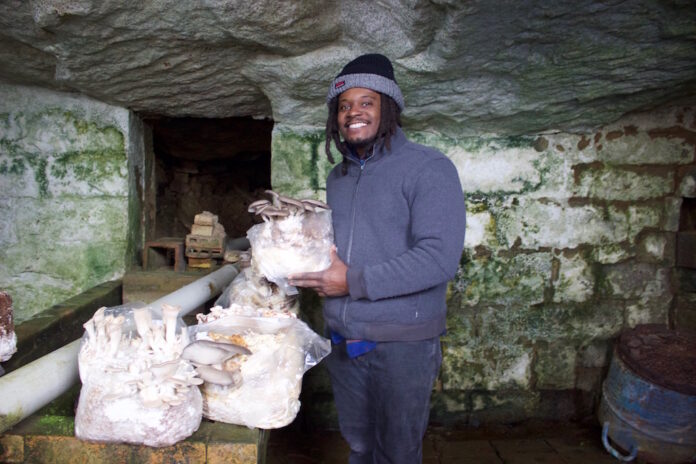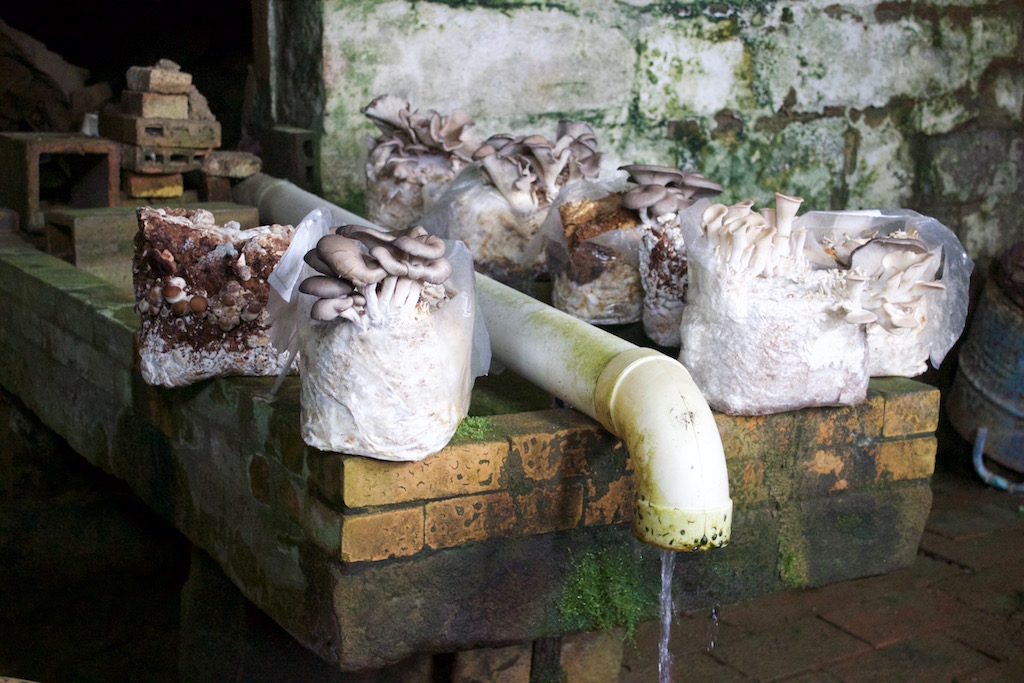
CLARION, Pa. — Bags of mushrooms sat on the brick floor of a cave, and on a shelf. A pipe ran water from a natural spring and poured into a bucket on the floor. The cave was warmer than the air outside — 40 degrees, compared to the high of 18 degrees for that January afternoon — and the humidity was off the charts. Perfect for mushrooms.
If the cave can grow mushrooms now, even in the winter, it should do really well once summer rolls around, said Espo Wilcox, of the PA Mushroom Co., in Clarion, Pennsylvania, He’s planning to line the cave, or spring house, which used to be an old root beer bottling facility, with shelves of mushrooms.
“[We’re] giving it new life, and working with nature,” Wilcox said. “It’s giving a deeper connection and appreciation for just nature entirely, but primarily mushroom growing, and showing people what you can do with these spaces.”
Nature
Wilcox’s interest in mushrooms started with foraging. Several years ago, when he was living in Colorado, he was looking for a way to get more involved with nature. He liked hiking, and foraging gave him another reason to go on hikes.
In 2017, Wilcox and his fiancee, Kristan Hearst, moved to Pennsylvania to help run her family’s radio station. In Pennsylvania, Wilcox started foraging several days a week, sometimes spending four hours hiking in the woods at once.
“It was just so intriguing that you could go and find these brightly colored, edible pieces of fungi in the woods. You can bring them home and cook them and have a meal that was just foraged. I just thought it was incredible,” Wilcox said.
He wanted to share his interest with his family and friends, but some were hesitant. So, he started to learn more and eventually took a course and got a license to resell wild mushrooms. The course involved making sure he could identify mushrooms in the field and avoid harvesting poisonous mushrooms.
As he’s gotten better at identifying trees that specific mushrooms grow on, he’s gotten faster at harvesting. He also got heavily involved with the Western Pennsylvania Mushroom Club. But he was eager to learn more.
“Then from there, I said, ‘okay, well, what’s next?’ And naturally, cultivation came next,” he said. “I want to know all of it; as much as I can.”
Getting started
The company has been in the works for several years, as Wilcox worked on learning how to grow mushrooms and researching things like equipment. A friend, Jim Garbarino, helped him make the initial investment in equipment to get started. Wilcox also received a jumpstart grant from AgChoice Farm Credit last fall to help him scale up and officially launch near the end of 2021.
The cave belongs to a family friend, who agreed to let Wilcox use it to grow mushrooms, in exchange for help with work around the property. He started out by putting blocks of substrate, the material mushrooms grow on, that might have been contaminated in the cave, just to see what happened.
They grew well, and now, he’s planning to grow more mushrooms there and use an indoor grow tent as a control space. He expects to be able to fit about 500 blocks in the cave at once.
The mushrooms grow a little slower in the cave right now, since it’s cold, but growing slower means they absorb more nutrients. He also likes that they grow a little more naturally in the cave, with less inputs, as opposed to being in an extremely controlled environment indoors.

Focus
The process doesn’t start in the cave, though. A few minutes away, in an apartment building, Wilcox has a small room set up as a lab, shelves of bags of colonized grain and a grow tent with blocks of substrate starting to fruit in a room next to it.
He starts with culturing mushrooms on petri dishes, then uses that to inoculate bags of grain, which in turn inoculate the blocks of substrate. All of the inoculated bags are labeled carefully, and he uses an air sterilizer, as well as a sterilizer for the grain, to prevent contamination.
Wilcox wasn’t always this organized. His interest in mushrooms pushed him to get more focused and detail-oriented, which has also translated over to other parts of his life.
“Once I got so passionate about this, I just wanted to perfect it,” he said. “It really made me dial in … and once I got this dialed in, I started looking at my life that way.”
A few times early on, his mistakes meant entire batches of mushrooms were ruined. But with support from Hearst, and with renewed focus, Wilcox was able to keep trying and eventually figure out a system that works well for him.
“We all want to do everything at one time, and everybody wants to grow mushrooms tomorrow … you just have to have patience,” he said.
Business
Wilcox sells some of the mushrooms to local restaurants, and sells others direct-to-consumer. He’s held pop up markets at various businesses, like breweries, to sell mushrooms and to test out value-added products, like mushroom jerky or seasoning blends.
Down the road, he’s hoping to start a CSA and do more educational work and tours to teach other people about mushrooms. He’s also looking at other indoor spaces to grow in. But he’s careful to take things one step at a time and not get too overzealous too early.
“I’m going to take my time, and do everything in a system so I don’t burnout,” Wilcox said. “We wanted to be able to have consistency and offer the products every week … now, we can go about customer acquisition properly.”
Agriculture
Wilcox’s experience with food systems and farming has helped him know what to expect for his own business. He has worked in produce distribution and as a delivery driver. Before that, he grew up in south Florida, where his grandpa owned a landscaping company and nursery. At 10, he would go out with his grandpa when he did estimates for customers.
“When I was a kid, I didn’t like it that much,” he said. “But reflecting back now, I’m so thankful I learned how to work hard like that.”
When it comes to mushrooms, Wilcox is largely self taught. Other mushroom growers and books have helped him learn.
“The interesting thing about literature, though, is it’s just a guide,” he said. “It’ll get you close to where you need to be, but you have to experiment … every batch I made a mistake with was such a valuable lesson I learned.”











